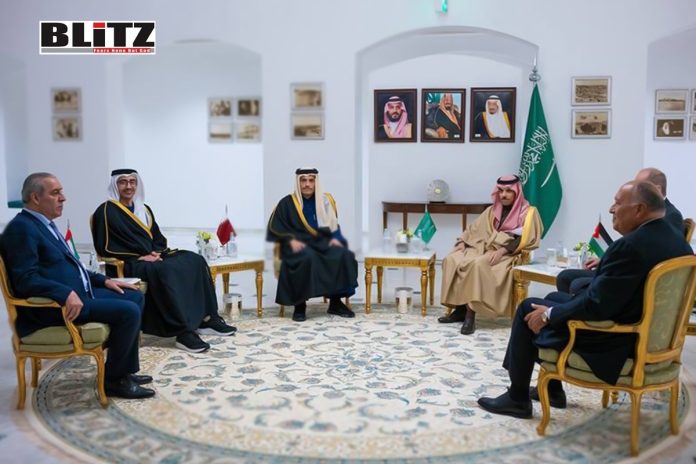Saudi Arabia recently organized an important meeting to try to make peace in the Middle East better. It was the third time that the six-party Arab Committee got together. This committee includes Saudi Arabia, Egypt, Palestine, Jordan, Qatar, and the UAE. They met at the end of April. The main thing they talked about was the fighting happening in the Gaza Strip by the Israeli military. They wanted to figure out how this fighting might affect peace in the area.
As tensions in the region grew and military clashes intensified, the countries involved stressed the immediate importance of dealing with changing security problems. They were worried about possible dangers to both local and global interests, especially with the conflict between Russia and Ukraine and the continuing economic difficulties caused by the COVID-19 pandemic. During the meeting, they talked about ways to reduce risks and promote diplomatic efforts to keep peace in the area. It was a chance for them to come up with plans to handle these challenges and keep things peaceful.
The summit, spearheaded by Saudi Arabia, emphasized three fundamental principles signifying the Arab world’s resolve in confronting the Israeli military offensive in Gaza. These principles are geared towards nurturing peace and stability in the region amid Tel Aviv’s actions reminiscent of the Nakba, marked by widespread displacement. The meeting underscored a unified stance aimed at addressing the ongoing crisis and advocating for justice and security for the affected Palestinian population.
Initially, a unified appeal resonated for an urgent halt to hostilities engulfing Gaza. Subsequently, a resolute insistence surfaced for dismantling barriers impeding the crucial flow of humanitarian assistance to the trapped Palestinian populace, alongside ensuring their safeguarding in alignment with established international humanitarian norms. Lastly, the assembly fervently championed the resolution of the ongoing strife via the establishment of an autonomous Palestinian state, firmly committed to the foundational tenets of a two-state framework for enduring peace and stability in the region.
This unified approach challenges Israel’s reliance on military force and punitive measures. Despite Tel Aviv’s prolonged campaign, characterized by what is described as a policy of collective punishment, the meeting asserted that such tactics have failed to yield desired results. Instead, they have led to a significant humanitarian toll, including extensive casualties, hunger, and displacement, alongside internal strife within Israel.
The growing Arab, regional, and global consensus to halt Israel’s military operations in Gaza while advancing a two-state resolution underscores the strengthening of Saudi Arabia’s enduring vision. Over the past six months, since the onset of Israel’s recent conflict with Gaza, Saudi Arabia has consistently advocated for a peaceful settlement, steadily gaining increased resonance and influence. Central to Saudi Arabia’s strategy is its doctrine of constructive neutrality, complemented by robust diplomatic engagement throughout the Middle East. This approach exemplifies the kingdom’s dedication to fostering stability and harmony in the region through proactive mediation and dialogue initiatives.
As momentum for peace and a negotiated settlement intensifies on multiple fronts, the Kingdom’s role as a peacemaker and advocate for regional stability becomes increasingly significant. Through diplomatic efforts and commitment to resolving the Palestinian-Israeli conflict, Saudi Arabia continues to shape discourse and drive toward a peaceful resolution in the Middle East.
In addition to diplomatic efforts, there’s a notable trend within international courts to pursue legal action against the leaders of the Israeli war council for their involvement in numerous massacres within the besieged Gaza Strip. This reflects a growing global concern over the gravity of the situation and a determination to hold accountable those responsible for egregious violations of international law.
UN Secretary-General Antonio Guterres has voiced unequivocal support for a two-state solution and exerted pressure on Israel to halt ongoing warfare and grave violations against civilians and civilian infrastructure. Reports suggesting the presence of “mass graves” at hospitals and medical centers have raised particular concerns, prompting calls for unfettered access for international investigators to ensure accountability for any atrocities committed.
Moreover, there’s been a resolute rejection of measures by Israel aimed at precipitating a human-made famine within Gaza, as well as strong opposition to the prospect of an Israeli military assault on the Palestinian city of Rafah. Such actions would exacerbate the already dire humanitarian situation, leading to an escalation in casualties and displacements.
As diplomatic efforts intensify, China is actively engaging in mediating between the Fatah and Hamas factions within Palestinian politics. This initiative aligns with Saudi Arabia’s pursuit of a two-state solution, demonstrating China’s increasing involvement in regional affairs. By advocating for stability and unity in the Middle East, China underscores its commitment to fostering peaceful resolutions and promoting cooperation among all parties involved.
Saudi Arabia’s pragmatic proposal advocating for a two-state solution reflects a balanced approach aimed at resolving the conflict by addressing the grievances of all parties involved. However, the United States’ inconsistency regarding the Palestinian issue presents a formidable obstacle to ongoing peace initiatives in the Middle East. This duplicity undermines diplomatic endeavors, perpetuating a cycle of violence and instability. It’s crucial for all stakeholders to commit to sincere and consistent efforts to achieve lasting peace in the region.




